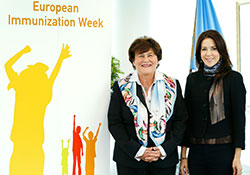Joint statement by Her Royal Highness Crown Princess Mary of Denmark and Dr Zsuzsanna Jakab, WHO Regional Director for Europe

WHO/Franz Henriksen
27 April 2016
Ensuring health and well-being at all ages is one of the 17 Sustainable Development Goals adopted by world leaders in 2015. In shaping this goal, the global community recognized that routine immunization is a stepping-stone to good health throughout life and that equitable access to vaccination programmes depends on collaboration, to overcome barriers and ensure that no one is left behind.
The European Region has already come a long way through its focus on the determinants of health and equity in the European Health Policy Framework "Health 2020" and on the immunization targets set in the European Vaccine Action Plan 2015-2020, developed by the countries in the Region.
Over the past 5 years, we have seen substantial progress in tackling vaccine-preventable diseases that threaten life at all stages, from pneumonia in infancy to cancer in adulthood. For the first time, we can celebrate the fact that, by the end of 2014, over half of the Region's Member States had interrupted endemic transmission of measles and rubella; furthermore, the Region has successfully maintained its polio-free status. The joint efforts made to overcome these shared threats contribute to improving the health of future generations.
However, during this period, we have also seen immunization coverage rates flatten or even decline, for the first time in decades. The deaths of children due to diphtheria and measles last year illustrate what happens when we lower our guard. Public awareness of immunization successes and the promise they represent should be strengthened.
Furthermore, political commitment to the Region's achievable targets for immunization and disease prevention must be sustained, or we risk falling back into complacency and acceptance of inadequate programme performance.
Together, we call on Member States to identify new ways to measure and communicate the full impact and value of vaccination, beyond saving lives and preventing disease. Prevented mortality and morbidity translate into long-term cost savings and potential economic growth, and vaccines can increase life expectancy by protecting against diseases. Vaccination programmes enhance equity by removing gender, social, cultural and economic barriers. Vaccines allow us to travel overseas without vaccine-preventable health risks to ourselves and others. By reducing the need for antibiotics, vaccines may also reduce the prevalence and hinder the development of resistant strains. The true value of immunization should be better understood by decision-makers, health workers and parents alike.
European Immunization Week marks a time to celebrate, to reflect on the success of vaccination and to consider the remaining challenges. With 53 countries participating in the 11th year of the campaign, it represents a strong, well-established platform for the Region to use in raising awareness that vaccines are safe, effective and necessary to maintain health and well-being.
Equitable extension of the benefits of vaccination to each and every person in the European Region requires sustained effort by each and every one of us. We urge all stakeholders to engage in events in their respective communities and to take part in advocating for continued progress towards our collective goals.



